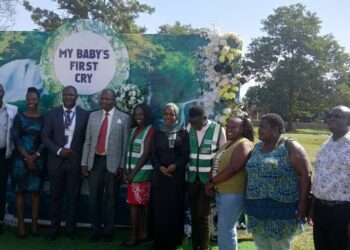The discussions that were hosted by the Human Rights Awareness and Promotion Forum (HRAPF) focused on the negative impact of criminalizing minor infractions, which often disproportionately affects mostly marginalized communities.
The CSOs urged lawmakers to reform outdated laws and adopt a more rehabilitative approach, arguing that decriminalizing petty offences would reduce congestion in prisons, alleviate the burden on the justice system, and promote social justice.
In his presentation, Edward Ssemambo Muteekanga, Programme Director at the Centre on Law and Marginalisation at HRAPF, pointed out to the MPs that although these offences are considered petty, they ultimately have a broader impact. He explained that while MPs themselves may not be directly affected, their relatives or constituents will often find themselves caught in the grip of petty offences, highlighting the wider social implications.
“Just like in many other African countries, Uganda’s Penal Code has several petty offences. The most notorious ones are: Being idle and disorderly – S.150. Being rogue and vagabond –S.151. Being a common nuisance – S.149. These provisions are too vague and outdated,” he said.
He revealed to the MPs that Petty offences are used to arrest persons who are marginalized in society and usually, the police conduct such arrests in swoops where large numbers of people are netted. Through these laws, police arrest innocent but marginalised people and again extort money from them as a way of buying their freedoms.
“Many of those arrested are charged under the rogue and vagabond provisions. Many spend a large time on remand. Many of those charged are convicted on their pleas of guilt. Almost all persons arrested are poor. Many of them are also marginalized, the poor, sex workers, drug users etc The arrests result in violations of human rights – particularly, the right to liberty and the right to freedom from inhuman and degrading treatment,” he said.
The chairperson of the committee Fox Odoi Oywelowo whose speech was represented by the Kigulu South Country Milton Muwuma agreed with counsel Ssemambo adding that these offences, such as “idle and disorderly” conduct, are entrenched in our Penal Code and inherited from colonial-era laws in England. Despite legal changes over time, these outdated provisions remain part of our system.
“Petty offences are broadly defined, granting law enforcers wide discretion in their application. Unfortunately, this has often led to the unfair targeting of vulnerable populations, including the poor, who already face societal exclusion. Research has shown that charges like being “idle and disorderly” or a “vagabond” are frequently used to justify the arrest of marginalized individuals, often without evidence of any criminal conduct. This practice violates their rights and traps them in cycles of poverty,” he said.
Fox Odoi added that in response to the findings by HRFF, alongside other civil society organizations, has been advocating for the declassification of petty offences in Uganda. Their efforts align with the principles of the Decriminalization of Petty Offences in Africa, which urge governments to reconsider criminalizing behaviours that disproportionately affect marginalized populations.
“As a country, we are now at a critical juncture. We must seize this opportunity to reflect on the role that petty offences play in our criminal justice system and their ongoing impact on the most vulnerable. Decriminalizing petty offences is not just a matter of legal reform; it is a matter of human dignity, equality, and fairness,” he said.
He added “I urge you, honourable members of Parliament, to support ongoing efforts to review and reform these outdated laws. Let us work towards a legal framework that upholds the rights of all citizens, especially the most marginalized.”
Tracy Ivy Nakayenga the Advocacy and Communications Officer at HRAPF informed the lawmaker that apart from the positive and landmark judgment in the case of Francis Tumwesige Vs Attorney General, there remain some offences in our law books that are then used to further marginalize already marginalized people.
“These offences create social divisions and reinforce class distinctions. For example, we often assume that individuals dressed in suits are ideal and respectable, but in reality, they too could be idle. This reflects a broader issue of inequality. Thank you for your attention on this matter. Now, I’d like to invite my colleague to discuss the history of these laws and why they are still part of our legal system. It’s important to note that those who originally introduced these laws have long since moved on, yet these outdated laws remain,” she said.
Macklean Kyomya, Executive Director of Alliance of Women Advocating for Change (AWAC Uganda) also echoed that petty offences are often used to judge individuals based on their social status. Urging that the victims of these crimes are typically those who don’t appear wealthy.
“For instance, how can someone be arrested for idleness or loitering while sitting in their car? On the other hand, ordinary Ugandans—those simply walking on the street or sitting at City Square are frequently targeted. They aren’t committing any crime; they’re just sitting there. Yet, when the police conduct a sweep, they are arrested for being idle. This also extends to sex workers, who are often charged with similar offences simply for being present in certain areas, regardless of their circumstances. In reality, it is these everyday citizens, including sex workers, who bear the brunt of such laws, which unfairly target marginalized groups,” she said.
Meanwhile, all MPs present agreed that the existence of petty offences in Uganda’s law books serves as a clear testament to the ongoing suffering of marginalized communities at the hands of law enforcement. However, MP Muwuma urged HRAPF to accelerate this campaign before election campaigns begin, emphasizing the urgency of addressing this issue on time.
Do you have a story in your community or an opinion to share with us: Email us at editorial@watchdoguganda.com














